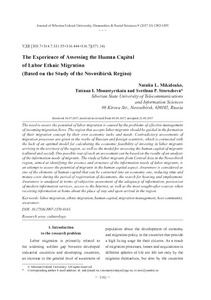The Experience of Assessing the Human Capital of Labor Ethnic Migration (Based on the Study of the Novosibirsk Region)
Скачать файл:
URI (для ссылок/цитирований):
https://elib.sfu-kras.ru/handle/2311/34780Автор:
Mikidenko, Natalia L.
Monastyrskaia, Tatiana I.
Storozheva, Svetlana P.
Микиденко, Н.Л.
Монастырская, Т.И.
Сторожева, С.П.
Дата:
2017-09Журнал:
Журнал Сибирского федерального университета. Гуманитарные науки. Journal of Siberian Federal University. Humanities & Social Sciences;2017 10 (9)Аннотация:
The need to assess the potential of labor migration is caused by the problems of effective management of incoming migration flows. The region that accepts labor migrants should be guided in the formation of their migration concept by their own economic tasks and needs. Contradictory assessments of migration processes are given in the works of Russian and foreign scientists, which is connected with the lack of an optimal model for calculating the economic feasibility of investing in labor migrants arriving in the territory of the region, as well as the model for assessing the human capital of migrants (cultural and social). One possible way of such an assessment can be based on the results of an analysis of the information needs of migrants. The study of labor migrants from Central Asia in the Novosibirsk region, aimed at identifying the essence and structure of the information needs of labor migrants, is an attempt to assess the potential of migrants in the human capital aspect. Awareness is considered as one of the elements of human capital that can be converted into an economic one, reducing time and money costs during the period of registration of documents, the search for housing and employment. Awareness is analyzed in terms of subjective assessment of the adequacy of information, possession of modern information services, access to the Internet, as well as the most sought-after sources when receiving information at home about the place of stay and upon arrival in the region Необходимость оценки потенциала трудовой миграции вызвана проблемами эффективного
управления входящими миграционными потоками. Регион, принимающий трудовых мигрантов, должен ориентироваться в формировании своей миграционной концепции на собственные экономические задачи и потребности. В работах российских и зарубежных ученых даются противоречивые оценки миграционных процессов, что связано с отсутствием оптимальной модели расчета экономической целесообразности инвестирования в прибывающих на территорию региона трудовых мигрантов, а также модели оценки их человеческого капитала (культурного и социального). Один из возможных способов такой оценки может базироваться на результатах анализа информационных потребностей мигрантов. Исследование трудовых этнических мигрантов стран среднеазиатского региона, проведенное в Новосибирской области, ориентированное на выявление сущности и структуры информационных потребностей
трудовых мигрантов, представляет собой попытку оценки их потенциала в аспекте человеческого капитала. Информированность рассматривается как один из элементов человеческого капитала, который может конвертироваться в экономический, сокращая время и денежные затраты, период оформления документов, поиска жилья и трудоустройства. Информированность анализируется в аспекте субъективной оценки достаточности информации, владения
современными информационными услугами и сервисами, возможности доступа к сети Интернет, а также наиболее востребованным источникам при получении информации на родине о месте пребывания и по прибытии в регион
Коллекции:
Метаданные:
Показать полную информациюСвязанные материалы
Показаны похожие ресурсы по названию, автору или тематике.
-
Историографический обзор подходов и концепций по проблеме миграции в зарубежных и российских исследованиях XX века
Замараева, Ю.С.; Zamaraeva, Julia S. (Сибирский федеральный университет. Siberian Federal University., 2010-06)Миграция определила эпоху XX века и позволила осуществиться межкультурной коммуникации. В связи с этим перед многими культурными группами остро встала дилемма: продолжение своего локального существования с целью сохранения ... -
Forced Migration in Modern Europe and Russia: Situation, Problems and Possible Ways to Optimize the Refugee Law
Volokh, Vladimir A.; Волох, В.А. (Сибирский федеральный университет. Siberian Federal University, 2016-04)The article by Professor V.A. Volokh is dedicated to one of the most controversial issues of our time – migration issues in and out of Russia. In the context of economic and political globalization not only basic ... -
Migration Issues at the Present Time: Experience and Prospects
Yuskova, Marina A.; Potemkin, Igor N.; Юскова, М.А.; Потемкин, И.Н. (Сибирский федеральный университет. Siberian Federal University., 2015-03)International migration in modern society is a substantially significant phenomenon in terms of size, socio-economic and political consequences for countries and regions. Migration policy is defined as a set of measures ... -
For the Sake of Faith of for the Sake of Land? Religion as a Factor of Conflicts between Migrants and Old-Dwellers in the Course of the Great Siberian Migration (Evidence from the Ognevo Village, Biysk District)
Kirillov, Alexey K.; Karavayeva, Anastasiya G.; Кириллов, А.К.; Караваева, А.Г. (Сибирский федеральный университет. Siberian Federal University, 2018-09)The article draws reader’s attention to the peasant migration from European Russia to Siberia between the abolition of serfdom at Russia (1861) and World War I (1914). This phenomenon is well known as an example of successful ... -
Development of Theoretical Provisions on the Adaptation and Integration of Migrants
Kononov, Leonid A.; Ledeneva, Viktoria Yu.; Кононов, Л. А.; Леденева, В. Ю. (Сибирский федеральный университет. Siberian Federal University, 2019)Recently, the terms “adaptation and integration of migrants” are often found in scientific and public literature. However, there is still no unified opinion and clear understanding of the essence and content of these ...

